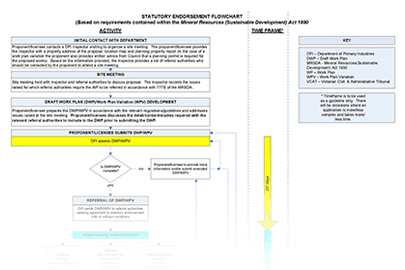Statutory endorsement of work plans
What is statutory endorsement of work plans?
Statutory endorsement of work plans is a legislative change made on 1 February 2012 to the Mineral Resources (Sustainable Development) Act 1990 (MRSDA). The legislation gives statutory recognition to the previous administrative practice of work plan endorsement. This also aligns to changes to the MRSDA regarding work plan requirements introduced on 8 December 2015.
Statutory endorsement is only applicable to a mining or extractive work plan/work plan variation where a planning permit or planning permit amendment is required.
The legislation can be found on the Victorian Legislation and Parliamentary Documents website.
Legislative change – Why?
The changes were brought about to:
Refine the current administrative process of endorsing work plans for the purpose of subsequent planning permit applications and give legislative weight to this process; and
To streamline the current approvals process to remove duplication and delays associated with duplicate referrals to agencies. This duplication occurs under the current administrative process of endorsing work plans when referrals are repeated during the planning permit application process.
What does this mean for the proponent/licensee?
Referrals[1] which were previously undertaken by council as part of the planning permit application process will now be done by the department. To do this the proponent/licensee is required to supply a planning property report, along with title documents, before the site meeting takes place.
From the planning property report the department will identify the relevant statutory referral authorities to attend the site meeting which should be organised by the proponent/licensee.
The key to successful statutory endorsement is early engagement by the proponent with referral authorities. This will be initially at the site meeting and then continued dialogue to resolve any issues and information requirements raised. this should be finalised before the work plan is submitted to the department via RRAM.
Proponents/licensees now have the opportunity to seek review, at the Victorian Civil and Administrative Tribunal (VCAT), of a statutory endorsement decision and any conditions attached.
Related information
Free planning property reports from the Department of Environment, Land, Water and Planning
How will the change be implemented?
A flowchart identifying the main steps in the process (see Figure 1) has been prepared in consultation with stakeholders.
Change will be implemented through the following key legislative provisions:
When a work plan/work plan variation is referred a referral authority has 30 days to respond (77TF).
A referral authority can:
- agree to statutory endorsement; or
- agree to statutory endorsement subject to conditions; or
- object to statutory endorsement on any specified ground (77TF).
It is deemed that a referral authority does not object to statutory endorsement if a response is not received within 30 days (77TF(3)).
Opportunity for review by VCAT of conditions on a statutorily endorsed work plan or on a department decision to refuse statutory endorsement (77TH).
The department must not statutorily endorse a work plan that is inconsistent with any comments that a referral authority provides (77TD).
Section 55(1) of the Planning & Environment Act 1987 does not apply to those parts of an application referred to in that section that consist of a work plan or a variation to an approved work plan given to a referral authority under section 77TE (77TG).
What other changes will occur?
This legislative change initiated changes to the:
- Victoria Planning Provision (VPP)
The former Department of Primary Industries worked with the former Department of Planning and Community Development to reflect the legislative changes within the VPP. Both departments identified that clauses 52.08 and 52.09 of the VPP required changing to make a statutorily endorsed work plan a planning permit requirement.
Linked to this, there was a need to incorporate referral exemptions within clause 66 of the VPP. The mining and extractive planning practice notes are currently being updated by the department and will be available soon.
This legislation became effective on 1 February 2012. Section 77TG of the MRSDA now overrides section 55(1) of the Planning and Environment Act 1987. Where a referral authority has had the work plan referred to them under the statutory endorsement process a referral under section 55 (1) of the Planning and Environment Act 1987 is no longer applicable.
Further Information
Contact us
Please email workplan.approvals@ecodev.vic.gov.au or contact the Information Centre.
[1] Every referral authority that the Department Head considers, having regard to the kind of work proposed under the work plan or variation, should be given the work plan or variation S.77TE MRSDA.
Page last updated: 02 Jun 2021
